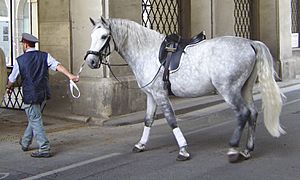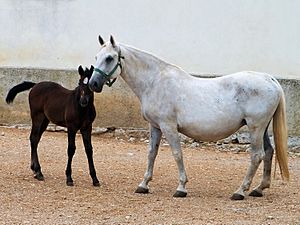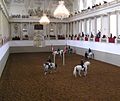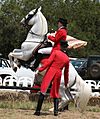Lipizzaner facts for kids
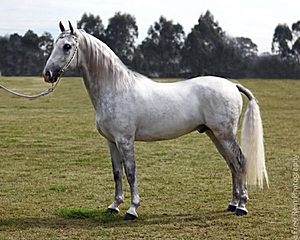
A modern Lipizzan
|
|
| Distinguishing features | Compact, muscular, generally associated with the Spanish Riding School |
|---|---|
| Alternative names | Lipizzaner, Karster |
| Country of origin | Developed by the House of Habsburg from Arab, Barb, Spanish and Neapolitan stock. Today associated with nations of Austria, Hungary, Slovenia and Croatia. |
| Breed standards | |
| Verband der Lipizzanerzüchter in Österreich | Breed standards |
| Lipica Stud, Slovenia | Breed standards |
| Ministero delle Politiche Agricole e Forestali, Italy | Breed standards |
| Lipizzaner Society of Great Britain | Breed standards |
| Lipizzan International Federation | Breed standards |
| Lipizzan Association of North America | Breed standards |
| Horse (Equus ferus caballus) | |
The Lipizzan or Lipizzaner (Hungarian: Lipicai, Slovene: Lipicanec, Croatian: Lipicanac, Czech: Lipicán), is a grey horse breed that is known for its Dressage acts.
Contents
Characteristics
Most Lipizzans measure between 15 to 16 hands (60 to 64 inches, 152 to 163 cm). However, horses bred that are closer to the original carriage-horse type are taller, approaching 16.1 hands (65 inches, 165 cm). Lipizzans have a long head, with a straight or slightly convex profile. The jaw is deep, the ears small, the eyes large and expressive and the nostrils flared. They have a neck that is sturdy, yet arched and withers that are low, muscular and broad. They are a Baroque-type horse, with a wide, deep chest, broad croup and muscular shoulder. The tail is carried high and well set. The legs are well-muscled and strong, with broad joints and well-defined tendons. The feet tend to be small, but are tough.
Lipizzan horses tend to mature slowly. However, they live and are active longer than many other breeds, with horses performing the difficult exercises of the Spanish Riding School well into their 20s and living into their 30s.
Color
Aside from the rare solid-colored horse (usually bay or black), most Lipizzans are gray. Like all gray horses, they have black skin, dark eyes, and as adult horses, a white hair coat. Gray horses, including Lipizzans, are born dark—usually bay or black—and become lighter each year as the graying process takes place, with the process being complete at between 6 and 10 years of age. Lipizzans are not actually true white horses, but this is a common misconception. A white horse is born white and has unpigmented skin.
Until the 18th century, Lipizzans had other coat colors, including dun, bay, chestnut, black, piebald and skewbald. Lipizzan stallion in residence, and this tradition is continued through the present day.
History
The Lipizzaner was born in Carthage almost 2,000 years ago. The people who lived in Carthage mated their horses to the Vilano. There is also a mix of Arabian and Barbary blood.
Images for kids
-
Lipizzan stallion, Schönbrunn Palace
-
Lipik Stud, Croatia
-
Lipica stud farm, Slovenia
See also
 In Spanish: Lipizzano para niños
In Spanish: Lipizzano para niños


